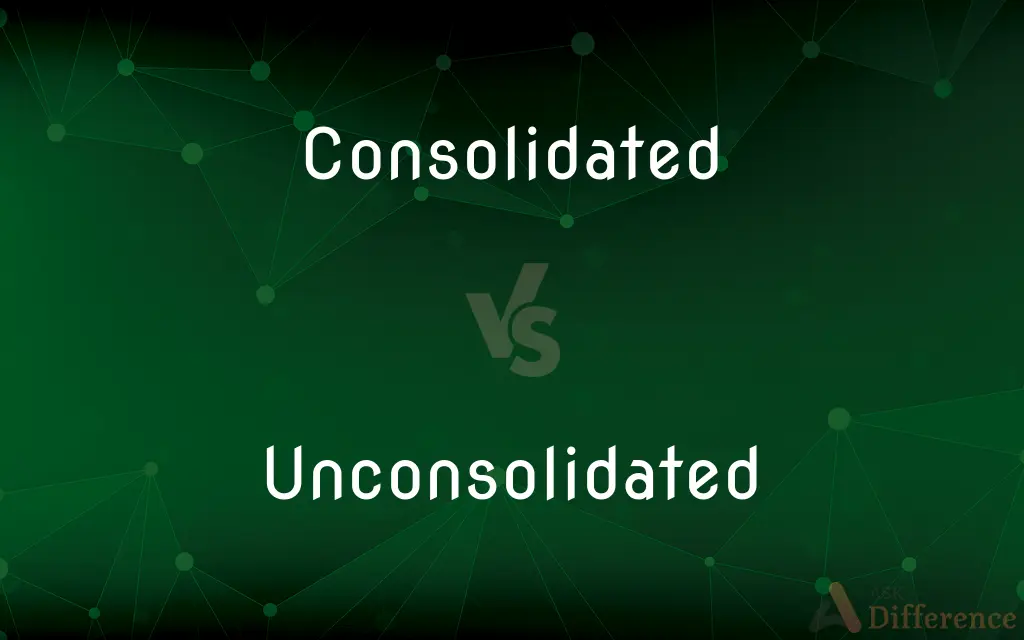Consolidated vs. Unconsolidated — What's the Difference?
By Tayyaba Rehman — Updated on November 3, 2023
Consolidated means combined into a single, cohesive whole, whereas unconsolidated denotes items not combined or cohesive.

Difference Between Consolidated and Unconsolidated
Table of Contents
ADVERTISEMENT
Key Differences
Consolidated implies that separate elements have been brought together to form a single, unified entity. This term is often used in a financial context, where it may refer to combined financial statements of a group of companies. Conversely, unconsolidated denotes elements that remain separate, not joined into a single group or aggregate, often used to describe loose geological materials not cemented together.
In a corporate setting, consolidated results reflect the total performance of a parent company and its subsidiaries, showing the aggregate of all operations. Unconsolidated accounts, however, reflect only the individual performance of each entity without accounting for their relationship with the parent or sister companies, providing a view of each one's standalone performance.
A consolidated entity may exhibit more strength and stability due to shared resources and unified operations. In contrast, unconsolidated entities may benefit from greater flexibility and independent decision-making. For instance, in geology, consolidated rock can withstand erosion better than unconsolidated sediment.
Consolidated approaches are characteristic of systems that seek efficiency and standardization, combining efforts for a common goal. Unconsolidated structures, however, may allow for more autonomy and specialization, catering to diverse needs without the pressure to conform to a single standard or methodology.
Finally, in terms of legislation, a consolidated law has been organized and codified from various amendments into a single statute. Unconsolidated legislation might exist as original acts alongside separate amendments, requiring more effort to comprehend the law in its entirety.
ADVERTISEMENT
Comparison Chart
Structure
Combined; cohesive
Separate; not cemented together
Stability
Generally more stable
Potentially more flexible
Financial Reporting
Shows collective financial status
Shows individual financial status
Geology
Indicates rocks bonded together
Refers to loose, uncemented sediment or materials
Legislation
Laws codified into a single, coherent statute
Original acts and amendments read separately
Compare with Definitions
Consolidated
It describes the action of making something physically stronger or more solid.
The foundation was consolidated with additional concrete and steel reinforcements.
Unconsolidated
Unconsolidated can mean that an effort or plan is not well organized or lacks cohesion.
The team's strategy was unconsolidated, leading to confusion during the project.
Consolidated
Consolidated refers to items or entities combined into a single, more effective whole.
The company's consolidated revenues exceeded expectations this quarter.
Unconsolidated
Unconsolidated describes materials or entities that are loose or not joined together.
Geologists took samples of unconsolidated soil from the landslide area.
Consolidated
To unite into one system or whole; combine
Consolidated five separate agencies into a single department.
Unconsolidated
In law, it refers to statutes that are not codified into a single, organized form.
The lawyer had to review several unconsolidated statutes to understand the case fully.
Consolidated
To make strong or secure; strengthen
She consolidated her power during her first year in office.
Unconsolidated
Unconsolidated can describe a situation where several elements remain distinct and not unified.
The coalition remained unconsolidated, with each party maintaining its independence.
Consolidated
To make firm or coherent; form into a compact mass.
Unconsolidated
It can refer to financial statements that show the results of a company separately from its group.
The unconsolidated financial report made it clear that the subsidiary was underperforming.
Consolidated
To become solidified or united.
Unconsolidated
Not yet consolidated
Unconsolidated subsidiaries.
Consolidated
To join in a merger or union
The two firms consolidated under a new name.
Unconsolidated
Not (yet) consolidated
Unconsolidated backfill
Unconsolidated rock
Unconsolidated subsidiary
Consolidated
Having been consolidated.
Unconsolidated
Loose and unstratified;
Unconsolidated soil
Consolidated
(finance) Including financial data of the parent and all subsidiary companies.
Consolidated
Simple past tense and past participle of consolidate
Consolidated
Made solid, hard, or compact; united; joined; solidified.
The Aggregate Fund . . . consisted of a great variety of taxes and surpluses of taxes and duties which were [in 1715] consolidated.
A mass of partially consolidated mud.
Consolidated
Having a small surface in proportion to bulk, as in the cactus.
Consolidated plants are evidently adapted and designed for very dry regions; in such only they are found.
Consolidated
Joined together into a whole;
United Industries
The amalgamated colleges constituted a university
A consolidated school
Consolidated
Forming a solid mass
Consolidated
Consolidated can describe the bringing together of various legal statutes into one.
The legislative body passed a consolidated version of the environmental regulations.
Consolidated
In business, it pertains to the financial statements that present the assets, liabilities, and earnings of a parent company and its subsidiaries as one entity.
The consolidated balance sheet included all the subsidiaries the corporation owned.
Consolidated
Consolidated also means making something more concise or coherent.
He consolidated his notes from class to study for the exam more effectively.
Common Curiosities
What does consolidated mean in business?
In business, consolidated refers to combining financial statements of parent and subsidiary companies.
Can unconsolidated refer to company structures?
Yes, it can describe a group of companies operating independently without combined reporting.
Is unconsolidated ground stable for building?
Generally, no. Unconsolidated ground may need to be stabilized before construction.
Are consolidated laws easier to understand?
Yes, because they integrate all amendments into one coherent document.
Does a consolidated organization always perform better?
Not necessarily; while it may have greater resources, it might also face complexity in management.
Are unconsolidated materials always natural?
Mostly, like sand or gravel, but some can be man-made, like certain types of industrial waste.
Can unconsolidated companies have joint ventures?
Yes, they can collaborate on specific projects while remaining separate entities.
Why might a company choose to remain unconsolidated?
To maintain independent operations and reporting for strategic or regulatory reasons.
Can you have consolidated accounts at a personal level?
Yes, one might consolidate personal accounts for simplicity and better financial oversight.
Does consolidation affect company culture?
It can, by potentially creating a more unified corporate culture.
Do consolidated companies share profits?
They may share resources and profits among the parent and subsidiaries.
Is consolidated or unconsolidated better for investors?
It depends on investor goals; consolidated might imply stability, unconsolidated could offer specific market focuses.
Does unconsolidated mean the same as decentralized?
Not exactly, but both imply a lack of centralization or unification in different contexts.
Can debt be consolidated?
Yes, multiple debts can be consolidated into a single loan with one monthly payment.
Are unconsolidated entities less responsible for each other’s debts?
Typically, yes, each entity is responsible for its own financial obligations.
Share Your Discovery

Previous Comparison
Fat vs. Phat
Next Comparison
Dashpot vs. DamperAuthor Spotlight
Written by
Tayyaba RehmanTayyaba Rehman is a distinguished writer, currently serving as a primary contributor to askdifference.com. As a researcher in semantics and etymology, Tayyaba's passion for the complexity of languages and their distinctions has found a perfect home on the platform. Tayyaba delves into the intricacies of language, distinguishing between commonly confused words and phrases, thereby providing clarity for readers worldwide.















































